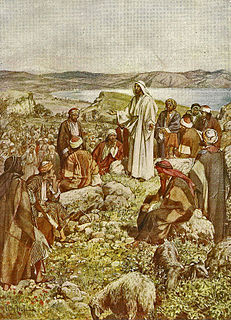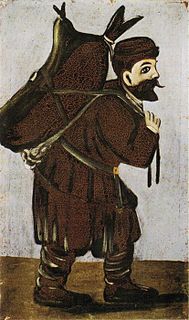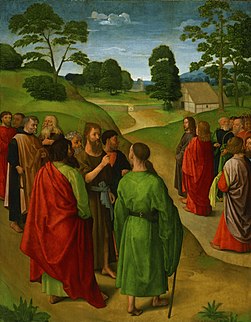Related Research Articles

Matthew 3:11 is the eleventh verse of the third chapter of the Gospel of Matthew in the New Testament. The verse occurs in the section relating the preachings of John the Baptist. In this verse he predicts that he will be followed by someone much greater than himself. The main theme of this verse is that John will soon be supplanted by a much greater figure and that John's water baptism is just a preparation for the much greater baptism by fire and spirit that will occur under the second coming of the Christian messiah Jesus, an original Christian concept that, according to Jewish scholars, lacks any fundament in the Hebrew scripture.

Matthew 5:1 and Matthew 5:2 are the first two verses of the fifth chapter of the Gospel of Matthew in the New Testament. The verses introduce the Sermon on the Mount that will be recited in the next several chapters. The previous verse mentioned the large crowds "from Galilee, and from the Decapolis, Jerusalem, Judea, and beyond the Jordan" who followed Jesus to witness him healing: these verses present Jesus as seeing the crowds and going up onto a mountain to begin teaching.

Matthew 5:20 is the twentieth verse of the fifth chapter of the Gospel of Matthew in the New Testament and is part of the Sermon on the Mount. Jesus has reported that he came not to destroy the law, but fulfill it. But in this verse, he makes clear that the common understanding of the Law is not enough.

Mark 2 is the second chapter of the Gospel of Mark in the New Testament of the Christian Bible. In this chapter, the first arguments between Jesus and other Jewish religious teachers appear. Jesus heals a paralyzed man and forgives his sins, meets with the disreputable Levi and his friends, and argues over the need to fast, and whether or not one can harvest food on Sabbath.

New Wine into Old Wineskins is a parable of Jesus. It is found at Matthew 9:14-17, Mark 2:18-22 and Luke 5:33-39.

Matthew 9 is the ninth chapter of the Gospel of Matthew in the New Testament and continues the narrative about Jesus' ministry in Galilee as he ministers to the public, working miracles, and going through all the cities and towns of the area, preaching the gospel, and healing every disease.
Matthew 9:15 is a verse in the ninth chapter of the Gospel of Matthew in the New Testament.

Matthew 7:28 is the twenty-eighth verse of the seventh chapter of the Gospel of Matthew in the New Testament. It forms the first part of a two verse conclusion following the Sermon on the Mount.

Matthew 9:9 is the ninth verse in the ninth chapter of the Gospel of Matthew in the New Testament.
Matthew 9:10 is a verse in the ninth chapter of the Gospel of Matthew in the New Testament.
Matthew 9:11 is a verse in the ninth chapter of the Gospel of Matthew in the New Testament.
Matthew 9:12 is a verse in the ninth chapter of the Gospel of Matthew in the New Testament.
Matthew 9:13 is a verse in the ninth chapter of the Gospel of Matthew in the New Testament.
Matthew 9:16 is a verse in the ninth chapter of the Gospel of Matthew in the New Testament.
Matthew 9:17 is a verse in the ninth chapter of the Gospel of Matthew in the New Testament.
Matthew 9:18 is a verse in the ninth chapter of the Gospel of Matthew in the New Testament.
Matthew 8:22 is the 22nd verse in the eighth chapter of the Gospel of Matthew in the New Testament of the Christian Bible.
Matthew 8:26 is a verse in the eighth chapter of the Gospel of Matthew in the New Testament.

John 1:37 is the 37th verse in the first chapter of the Gospel of John in the New Testament of the Christian Bible.

John 1:38 is the 38th verse in the first chapter of the Gospel of John in the New Testament of the Christian Bible.
References
- ↑ John MacEvilly, An Exposition of the Gospel of St. John consisting of an analysis of each chapter and of a Commentary critical, exegetical, doctrinal and moral, Dublin Gill & Son 1879.
- ↑ Cornelius Cornelii a Lapide; Thomas Wimberly Mossman The great commentary of Cornelius à Lapide, London: J. Hodges, 1889-1896.
- 1 2 3 4 5 6 "Catena aurea: commentary on the four Gospels, collected out of the works of the Fathers: Volume 6, St. John. Oxford: Parker, 1874. Thomas Aquinas".
 This article incorporates text from this source, which is in the public domain.
This article incorporates text from this source, which is in the public domain.